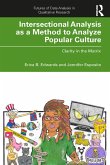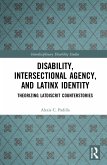Intersectional Analysis as a Method to Analyze Popular Culture: Clarity in the Matrix explores how race, class, gender, sexuality, and other social categories are represented in, and constructed by, some of the most significant popular culture artifacts in contemporary Western culture. Through readings of racialized television sitcoms, LGBTQ+ representation in mainstream American music, the role of Black Panther in Western imperialist projects, and self-love narratives promoted by social media influencers, it demonstrates how novice and emerging researchers can use intersectional theory as an analysis method in the field of cultural studies. The case studies presented are contextualized through a brief history of intersectional theory, a methodological rationale for its use in relation to popular culture, and a review of the ethical considerations researchers should take before, during, and after they approach popular artifacts. Intended to be a textbook for novice and emerging researchers across a wide range of social science disciplines, this book serves as a practical guide to uncover the multiple and interlocking ways oppression is reified, resisted and/or negotiated through popular culture. 2021 Winner of the AESA Critics' Choice Book Award
Hinweis: Dieser Artikel kann nur an eine deutsche Lieferadresse ausgeliefert werden.
Hinweis: Dieser Artikel kann nur an eine deutsche Lieferadresse ausgeliefert werden.








